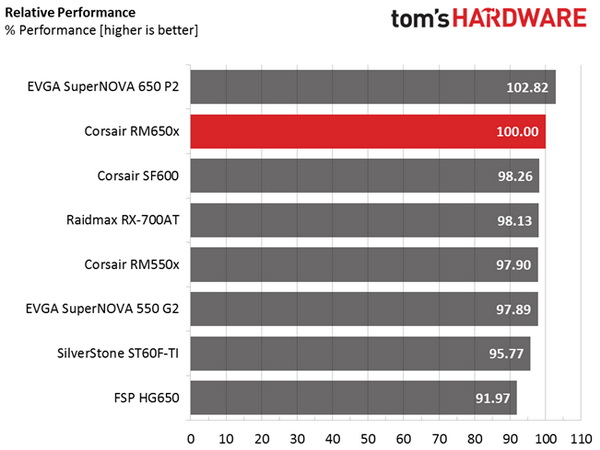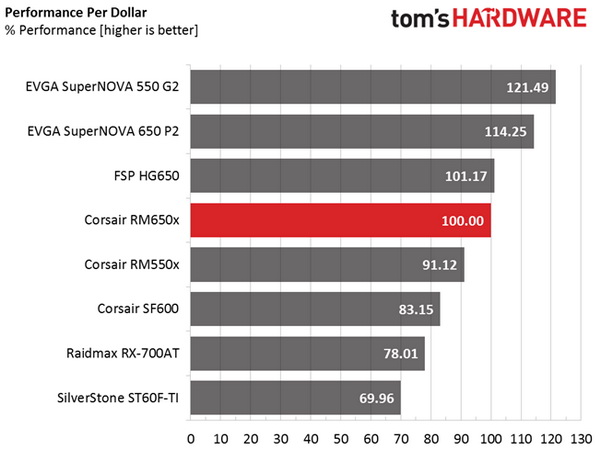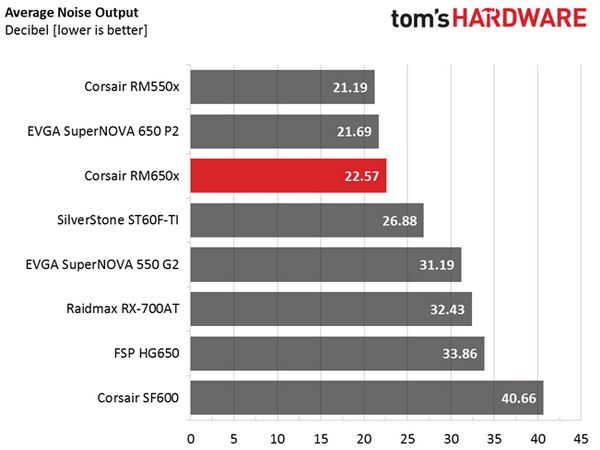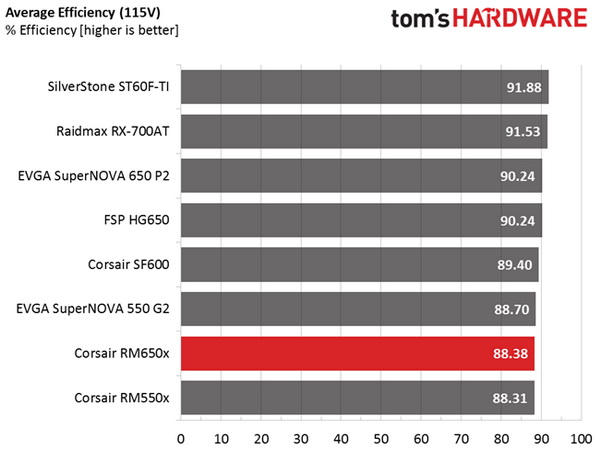Corsair RM650x PSU Review
Another Corsair PSU is in the lab, commanding our attention. We already reviewed the RM750x and RM550x, so we couldn't leave out the RM650x. It promises the same high performance as its siblings, along with super quiet operation.
Why you can trust Tom's Hardware
Performance, Performance Per Dollar, Noise And Efficiency Ratings
Performance Rating
The following graph shows the RM650x's total performance rating, comparing it to other units we have tested. To be specific, the tested unit is shown as 100 percent, and every other unit's performance is shown relative to it.
Unfortunately, we didn't test the EVGA 650 G2 with 115VAC input, so we can only compare the RM650x to EVGA's 650 P2. As you can see, the performance difference is notable. Then again, the 650 P2 is a Platinum-rated PSU while the RM650x only satisfies the 80 PLUS Gold standard. We should also note that with 230V input, for which we have test data for the 650 G2, the RM650x clearly leads with a 3.54% difference (EVGA 650 G2: 96.46%, Corsair RM650x: 100%).
Performance Per Dollar
The following chart may be the most interesting to many of you because it depicts the RM650x's performance-per-dollar score. We looked up the current price of each PSU on popular online shops and used those prices and all relative performance numbers to calculate the index. If the specific unit wasn't available in the United States, we searched for it in popular European Union shops, converting the listed price to USD (without VAT). Note that all of the numbers in the following graph are normalized by the rated power of each PSU.
The RM650x sells at a fair price, so its performance per dollar score is quite high. But EVGA is very aggressive with the price of its 650 P2; at the time of writing, that PSU was sold for less than the RM650x! This is what tough competition between companies achieves: lower prices and better products.
Noise Rating
The graph below depicts the cooling fan's average noise over the PSU's operating range with an ambient temperature between 28 °C and 30 °C (82 °F to 86 °F).
This is a quiet PSU. The difference between it and the 650 P2 is so small as to be imperceptible.
Efficiency Rating
The following graph shows the RM650x's average efficiency throughout its operating range with an ambient temperature between 28 °C and 30 °C.
Get Tom's Hardware's best news and in-depth reviews, straight to your inbox.
Efficiency could be a bit higher. However, it's still good for a Gold-rated PSU. The Platinum-certified 650 P2 is way ahead, though.
Current page: Performance, Performance Per Dollar, Noise And Efficiency Ratings
Prev Page Ripple Measurements Next Page Pros, Cons And Final Verdict
Aris Mpitziopoulos is a contributing editor at Tom's Hardware, covering PSUs.
-
maxwellmelon for all the good listed in this article, this series of psu just gets bashed in the fourms, just interesting.Reply -
basroil Reply18305746 said:for all the good listed in this article, this series of psu just gets bashed in the fourms, just interesting.
You're thinking of the older RM650, different design.
The review here just made this unit be one of my recommended 650 models, tied with the EVGA G2/P2 and just below the Seasonic 660XP2! -
pjc6281 I have had this PSU for my new Skylake build for 2 months. Its GREAT, quiet and even have it pushing my old dinosaur Nvidia 590 with no problems. My old power supply was a Corsair AX1200 that was rock solid as well. Nothing but good experiences with them. I know others differ.Reply -
Dark Lord of Tech ReplyRMX doesn't get bashed , RMX and RMI are very very good. I own the RMX 850 , GREAT UNIT. -
TechyInAZ I'm glad the new RM series is much higher quality. All I remember Corsair having is a bunch of bad PSUs with select few good PSU (like AX and HX).Reply
I hope this same kind of quality intros into other models like the newly refreshed CX PSUs. -
Reply18305746 said:for all the good listed in this article, this series of psu just gets bashed in the fourms, just interesting.
Yeah, I believe you are confusing the RMx and RMi with the older, mostly discontinued RM line. And of the old RM line only the 750w and 850w versions that were first made by Chicony Power Technology had the bad reputation. Anyone bashing the RMx and RMi doesn't know what they are talking about. Once misinformation gets out there it's hard to get it corrected though.
Another great review Aris! :) -
Reply18308072 said:Why buy Corsair or EVGA when you can get a Seasonic?
Seasonic doesn't have a lock on quality. They also don't offer a 10 year warranty which both Corsair and EVGA do on some models. Just off the top of my head Flextronics, CWT and SuperFlower are all capable of making units that are at least equal to high end Seasonic quality. There are others as well. -
TechyInAZ Reply18308188 said:18308072 said:Why buy Corsair or EVGA when you can get a Seasonic?
Seasonic doesn't have a lock on quality. They also don't offer a 10 year warranty which both Corsair and EVGA do on some models. Just off the top of my head Flextronics, CWT and SuperFlower are all capable of making units that are at least equal to high end Seasonic quality. There are others as well.
Plus, efficiency levels are typically better with EVGA than Seasonic. -
Reply18308342 said:18308188 said:18308072 said:Why buy Corsair or EVGA when you can get a Seasonic?
Seasonic doesn't have a lock on quality. They also don't offer a 10 year warranty which both Corsair and EVGA do on some models. Just off the top of my head Flextronics, CWT and SuperFlower are all capable of making units that are at least equal to high end Seasonic quality. There are others as well.
Plus, efficiency levels are typically better with EVGA than Seasonic.
:??: Not sure what you mean. EVGA has a couple of 80 Plus Titanium models but Seasonic has Titanium models in their new lineup. I'm not sure if those new Seasonic models are available yet though. Other than that I've had an 80 Plus Platinum Seasonic ( 660XP2 ) for a couple of years and their Platinum line has been out since at least 2011.



